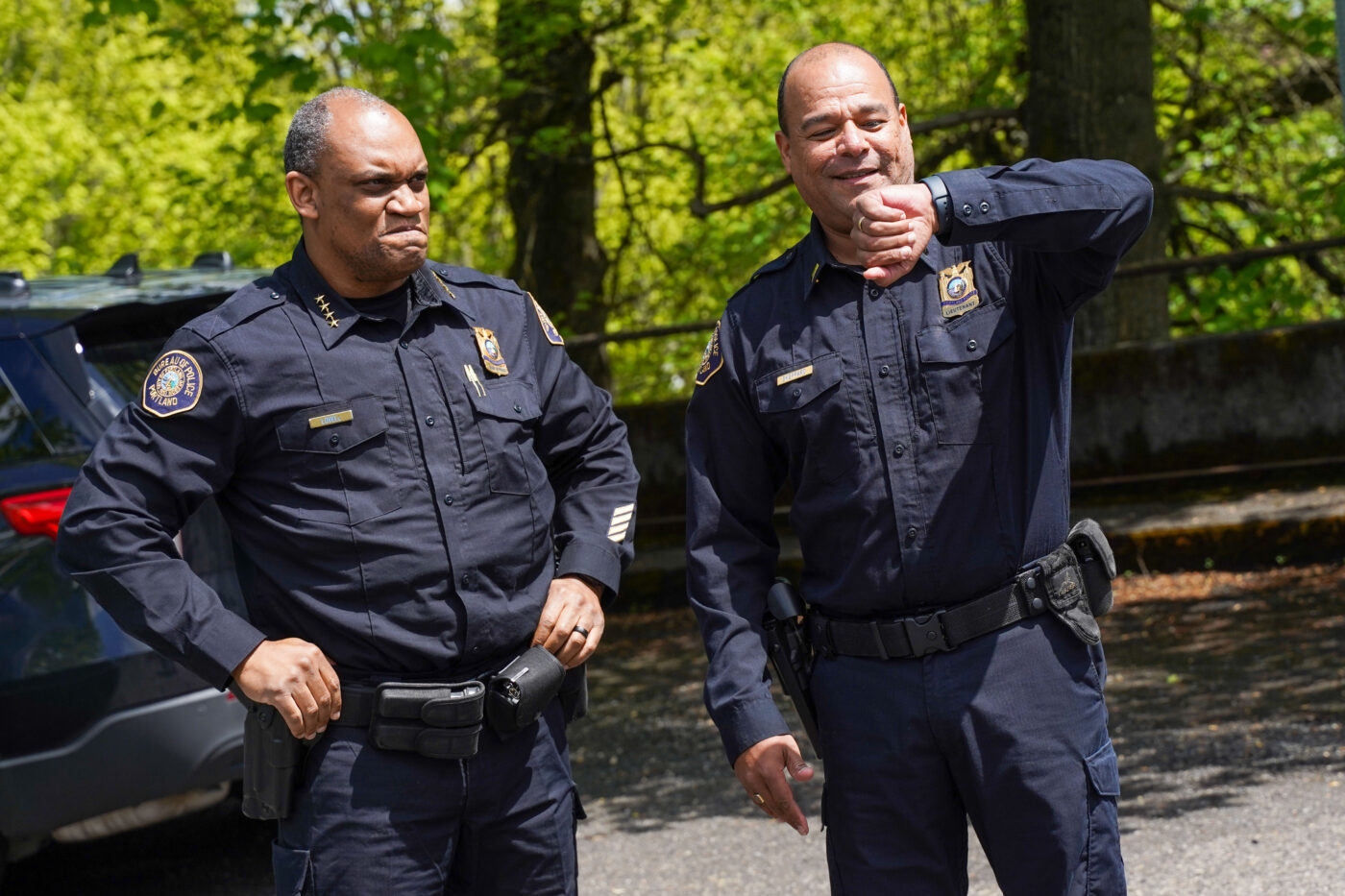

“We’re in a different time now. I think we’re moving away from some of the thoughts of 2020.
– Chuck Lovell, Chief of Police
What a difference a few years (and shifting political winds) makes. In the parking lot of a building where many arrests and protests took place just a few years ago, Portland Police Chief Chuck Lovell stood in front of a half-dozen officers and two motorcycles to announce a plan beef up enforcement of traffic laws.
It was a show of confidence and positive vibes from the PPB that would have been unheard of in 2020 or 2021.
“I’ve waited just over two years for this day,” Lovell beamed as he looked out at about a dozen reporters who came out to the Penumbra Kelly Building on East Burnside to hear the news. “Starting Thursday the 11th of May, we’ll be bringing back our traffic division… It’s a great day, it’s a day I’ve looked forward to for a long time.”
The new Traffic Division will hit the streets this Thursday with 10 motorcycle officers, two officers in patrol cars, and two sergeants. The officers will be split up into two groups that will cover the city seven days a week from 5pm until 3am. It will mean Portland will have a fully-staffed and dedicated Traffic Division for the first time in 27 months. By comparison, in 2008, before PPB began to reduct Traffic Division staff levels, they had about 35 motorcycle officers and 10 to 12 patrol car officers. Another detail offered today was that the division will be reevaluated every few months and PPB hopes to add officers as trainees become ready for duty.
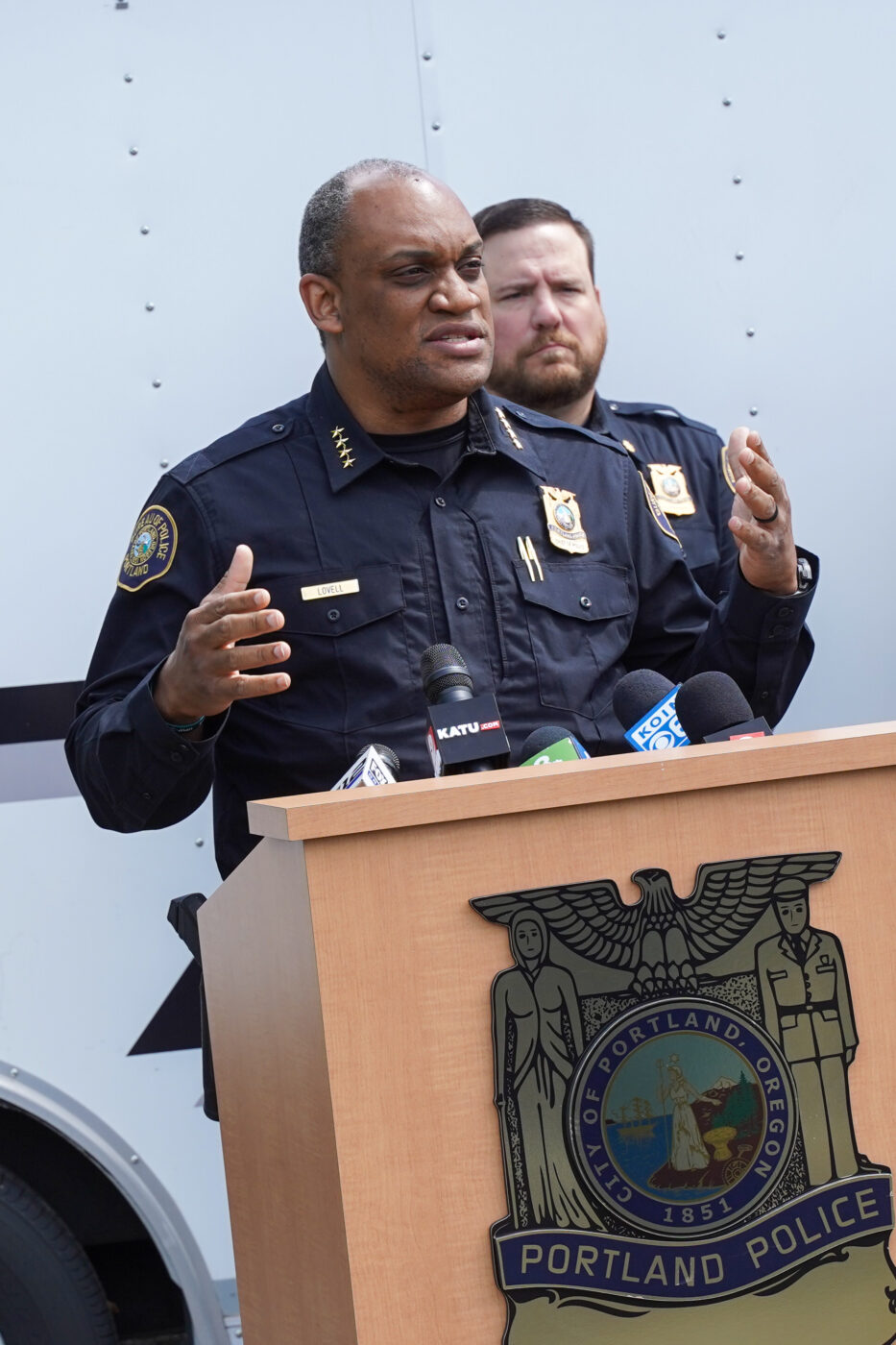

Asked at the press conference if the current budget proposal from Mayor Ted Wheeler that will allow the PPB to hire 43 more police officers had anything to do with the announcement, Chief Lovell said no.
Lovell dissolved most of the Traffic Division in 2020 in what he called a “reorganization” that put officers back out into general patrol. It happened less than two months after the leader of the Portland Police Association, the union that represents PPB officers, warned that looming budget cuts would spell its demise. Some Portlanders, and at least one former city council member, said the move was a political ploy to show the consequence of reducing the police budget. It happened during a time of very heated emotions at City Hall and on the streets — emotions that have cooled way down.
When a reporter asked Lovell how he’d respond to folks who have concerns about racial profiling, Lovell said,
“We’re focused on driving behavior, not demographics, or things of that nature. We’re always as an organization looking to reduce disparities… And you know, we’re in a different time now. I think we’re moving away from some of the thoughts of 2020, and it’s more like, ‘Hey, we as a city really need certain things, and we miss certain things that have an impact on our lives when we don’t have them.’ And I think, you know, when we look back on the last couple of years, there’s many things that kind of fall into that category. And I think for a lot of people, traffic would be one of them.”
Today, Lovell said moving officers away from traffic enforcement came as a response to low staffing levels. But he also tamped down the idea that that issue is resolved. “I want to let people know we’re not making this move out of abundance, or an excess of officers,” he said. Moving officers into full-time traffic enforcement duty, he added, would have a negative impact on precincts. The primary reason for the move, he said, is to address a backlog of 97 trainees who need to learn traffic-related skills (like processing DUIs, traffic crashes, and so on) in order to move on in their training. Lovell also cited the upcoming Rose Festival as a reason he thinks now is the right time to make this shift. Traffic control is a big part of Rose Fest activities and PPB will beef up traffic officers even more for the one-month period of parades and other events.
“We’re really glad to see this.”
– Dylan Rivera, PBOT
The sole remaining motorcycle officer dedicated to traffic duties for the past two years has been Sgt. Ty Engstrom, who was the only other person to speak at today’s press conference. “We have speed racing events going on, we have fatal crashes that are setting record numbers each year… hundreds of citizen initiated traffic enforcement requests have gone unanswered. I didn’t have the resources to send officers to go and deal with those neighborhood complaints,” Sgt. Engstrom said.
The focus with the new officers will be DUIs, streets and intersections on the city’s high crash network, and what Engstrom referred to as, “dangerous driving behaviors.”
Two years ago Engstrom was at another press conference where he willingly broadcasted the fact that PPB had little to no traffic enforcement at all. I asked him today whether he thought that had an impact on driving behaviors. “Some of it is people just think they’re not going to get caught,” he acknowledged. “So yeah, absolutely, I think that all played a role. And we’re hoping that with your help, we can get the word out that we’re back. And we’re going to be out there as often as we possibly can.”
Dylan Rivera, a public information officer with the Portland Bureau of Transportation, also attended the press conference (although he was just there to listen and take notes as it appears there wasn’t coordination of the announcement with PBOT). “We’re really glad to see this,” Rivera said when I asked him the role of police in transportation safety. “And we are hopeful that this will help us kind of set a new trend, post-pandemic, of less traffic violence on the streets, less of the sort of lawlessness and dangerous driving people have seen during the pandemic.”
And unlike his predecessor Jo Ann Hardesty, PBOT Commissioner Mingus Mapps welcomes a larger police presence focused on traffic laws. “I am grateful that the traffic division is returning,” Mapps shared in an email to BikePortland today. “I have advocated for this since taking on the Bureau of Transportation. We have had record traffic-related fatalities in the last three years, and I hope this helps the current trend of lowering the rate.”



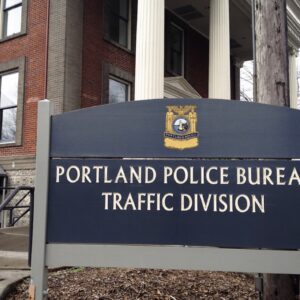
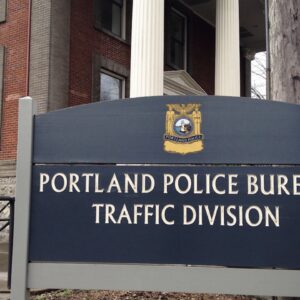
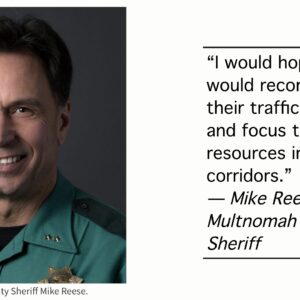
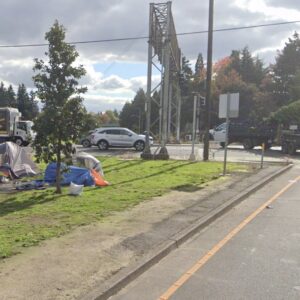
Thanks for reading.
BikePortland has served this community with independent community journalism since 2005. We rely on subscriptions from readers like you to survive. Your financial support is vital in keeping this valuable resource alive and well.
Please subscribe today to strengthen and expand our work.
We do need to be careful about how facially neutral policies and practices such as “traffic enforcement on high crash corridors” can impact Communities of Color because what we know is that most of these arterials are in such neighborhoods. There are 6 high crash corridors west of the Willamette River compared to 14 east of I-205 where Portland’s most diverse neighborhoods exist.
The challenge is that historically we have not had geographic equity in enforcement. Today, for example, 2/3 of the City’s automated cameras that have the ability to cite for speeding are located east of I-205 (source: https://www.portland.gov/transportation/vision-zero/speed-cameras#toc-locations). I am a proponent of speed cameras because they can help address the significant disparities we see in who dies in traffic crashes (https://www.hsph.harvard.edu/news/press-releases/racial-disparities-traffic-fatalities/). If the City can be more intentional about geographic equity, then that will help ensure long term public support in a critical tool for achieving safe streets.
We need to be reducing the number of instances where armed officers are interacting with members of the public. If we were to compare someone getting a citation from a uniformed police officer versus receiving a citation in the mail from a fixed speed safety camera, the difference is that there is no scenario where the letter in the mail escalates to a member of our community being a victim of police violence- but the end result of a citation is still the same. This is where the focus ought to be. Automated enforcement can also include the mobile radar van which PPB has used in the past to conduct camera enforcement at different locations.
Other things that can help address traffic safety include:
1) A commitment to income-based fines so that we don’t have a disparate impact on people experiencing lower incomes.
2) The City should affirmatively build safer streets which it is uniquely positioned to do. This includes streetlighting, adjusting travel lane widths, adding protected bike lanes and crosswalks. This can be done with a greater focus on near-term improvements using paint while longer-term capital-intensive projects take shape. This addresses the root cause instead of over relying on fines and fees to compensate for what is lacking in street design
3) Ensuring that people in living east of I-205 have a connected network of safe places to walk and bike in the near-term using tools such as alternative sidewalks (ex. https://www.portland.gov/transportation/pbot-projects/construction/ne-60th-alternative-pedestrian-walkway-pilot-project)
4) Utilize unarmed enforcement methods. One example in Oregon is commercial truck inspections/enforcement which takes place by ODOT employees (https://www.youtube.com/watch?v=GQwcL97_EEA) (https://www.oregon.gov/odot/MCT/Pages/TruckSafety.aspx)
We need to recognize that not everyone experiences our public spaces in the same manner and that discretionary enforcement can sometimes lead to outcomes that are not in the community’s interest. Our policies should take that into account and have appropriate guardrails to make sure we are getting the outcomes we want as a community.
“1) A commitment to income-based fines so that we don’t have a disparate impact on people experiencing lower incomes.”
When a car driver almost kills me or kills other people I could give a rats ass how much they make. Getting run over by someone who makes $20 grand a year vs. someone who makes $1 million a year makes ZERO difference.
If you cannot afford the fine, OBEY the traffic laws.
Also we have NO Communities of Color in Portland, we have about 25% non white population that is spread all over the city.
I have no idea why people here insist this is a diverse city, It is not by any measure.
But it might make a difference to them. Why should the person who gets paid $1 million a year give a rats ass about paying attention to traffic laws when the fines are a rounding error? Conversely, why should someone who makes $20k risk eviction to pay a traffic fine?
This is just another way of saying ‘if you can afford the fine, you don’t need to obey the traffic laws’
I don’t care if person can’t afford the fine. I really don’t and the fines could never be high enough to discourage wealthy people , and I don’t care about that either.
I care about being safe on the streets and I care about pedestrians getting killed in record numbers.
You can care about the Car Drivers, it’s clear that they are you and others here protected class. A lot of lower income people also drive around with no insurance, I am sure you can justify that also.
This whining about fines for traffic violations is amazing considering the carnage. Peoples lives Don’t matter if it might effect reckless drivers credit rating.
This I believe.
Many of the pedestrians being killed on our roads are housing insecure and/or houseless. Some end up camping near homicidal traffic sewers because they were swept from places where affluent people live (e.g. the people who don’t care). If you cared about pedestrians getting killed you would also care about brutal and inhumane sweeps and support the right of human beings to rest.
Another person who thinks that dead people are less important than someone paying a traffic ticket…
Those homeless people are being run over by drivers you think are too poor to pay tickets?
As if that is important?
Since we all like evidence-based solutions (or at least claim to when it suits us), is there any evidence that there is a problem with Oregon millionaires driving like maniacs because, heck, what’s another $150, and I’ll just let my chauffeur drive if I lose my license? The folks I know who have money absolutely do not think like this, and the people who tear through my neighborhood are mostly young or have no license plates.
I feel like this whole line of thinking is based on stereotype and pastiche, not on actual facts. If there is evidence that the problem is real enough to merit the extra complication and political headaches, then it would probably change my thinking.
ExActly, People turning themselves inside out to protect Car Drivers and “own” people on this website.
It’s complete nonsense with no facts or statistics to back it up except “eviction” or some gaslighting evasion.
Carheads…..
You should go talk to people out in the world. Many people who are just thousand-aires consider speeding tickets a cost of doing what they want.
Talking about a millionaire was to demonstrate a concept, as I’d hope you would know, not provide an example of a literal problem.
What problem is your proposal solving? Some people love to talk about “day fines” but they’re an ideological solution to a non-existent problem with lots of political hurdles to implementation.
The logical outcome of the Equity argument is that a poorer person who kills another person should get less punishment because they are poorer.
The logical outcome of the Equality argument is that the person would get the same time as anybody else committing the same crime.
Which argument seems more reasonable?
The logical outcome of the equity argument is a legal system that is not based on atavistic, inhumane, and puritanical punishment (e.g. a fundamentally unamerican system).
Equality under the law does not require puritanical or inhumane punishment. Where did that idea come from?
I take this to mean that you feel it is unfair that the city is apparently prioritizing the protection of some communities over others by relying on a data based approach. I agree it seems unfair that pedestrians and cyclists in wealthier parts of the city should not also enjoy the protection of enforcement cameras, even if the data suggests the problems are less acute in those areas. Political optics is probably more important than saving lives at this point, at least while the program is growing.
My favorite thing about the cameras is that they, like the lottery, are completely voluntary; it is trivial to opt-out.
Put the cops where the problem is. Period. It doesn’t matter to me the color of the person running the red light almost slamming into my family on a weekend bike ride, I just want deadly motorists behavior to stop. If more dangerous driving is in certain neighborhoods, then that is where I want safety efforts to focus.
Regarding income base fines – are low income people driving cars going to somehow kill us any less because they have less money? If not, fine them at the same levels as anyone else. Fines should be based on the danger that ones actions present to the community, not income level.
Leave it to Mr. Maus to attempt to impune Officer Engrstrom (our one remaining traffic officer) as a cause for the record traffic deaths in Portland. Come on JM, it took about two nanoseconds for people to realize they NEVER saw any cops pulling people over for infractions and they changed their driving habits to match that reality.
Engrstrom’s comment appeared in every major news publication in Portland though, so it’s hard not to blame him for waving the wand of impunity at Portland drivers.
I think it was a terrible and politically-motivated, agenda-pushing decision to intentionally broadcast the lack of enforcement like that and I want Engstrom and others to not forget that they did that. They put their own agenda above safety of Portland in my opinion.
I think you are both right: Engstrom shouldn’t have said it, but Maria B is also correct that it took Portland drivers about five seconds to figure out they wouldn’t get caught.
yes. But my point is, PPB threw gas on that fire by going out of their way to tell portland “We will not bust you for driving like assholes. so go ahead and do it.”
JM- I would say YOU put YOUR ideology ahead of public safety by jumping on the post Floyd “defund the police” mantra…suggsting “police alternatives” and “root cause” work would be sufficient to keep our streets safe. Maybe look at yourself and how your actions have harmed the community of Portland instead of just casting stones at others?
Can you articulate how JM’s “actions” harmed the community? The PPB weren’t defunded.There was no changes to make them more accountable. Our current state is the result of a fully funded police force making decisions about how to “protect” the community. Do you believe JM has influence over the Portland Police?
So you’re castigating him for being honest with the public? It was IMPORTANT for Portlanders to know the truth. Let’s not encourage public officials to minimize threats to public safety.
what are you talking about? “castigating him”?? It was a very basic question asked in a respectful tone. Dude’s job is to answer my questions.
It is very odd how Car centric the BP commenters are.
Every one of these articles will have half the posts complaining about traffic enforcement like Car and Driver magazine readers…
As someone who actually rides a bike most of the time, I could care less how many cameras, how many traffic cops, how many CAR DRIVERS get tickets or are pulled over and ticketed for not obeying simple traffic laws no matter what the income level or race is or what neighborhood they live in.
Only about 2% of the people who might kill me are ever cited for their reckless driving.
So much concern here for the bad car drivers that attempt to run over me all the time. Spare me the tears over targeting Car Drivers for infractions.
Lack of traffic enforcement has a HUGE impact on the safety of all road users but especially on POOCs (people outside of cars). There’s nothing odd about cyclists (most cyclists) being concerned about the behaviors of the drivers who are most likely to kill them.
75% of speed cameras are in the narrow slice of Portland E of I205 so income level and race clearly does matter. I’m not opposed to speed cameras — I’m just opposed to the litany of excuses from PBOT and BP commentators for why we can’t install a lot more of them in a less race- and class-biased manner.
Washington DC has over 700 speed cameras, many of them installed in the last 5 years, so please explain why PBOT has installed just a handful.
https://www.fox5dc.com/news/more-speed-cameras-coming-to-dc-in-2023
“why we can’t install a lot more of them in a less race- and class-biased manner.”
Currently, the cameras are placed on the basis of need. It sounds like you are advocating for increasing the degree to which they are placed on the basis of race and class. Ironic.
I think it has been frustrating to a lot of people that more cameras weren’t installed, and that the roll-out is taking so long. I remember Chloe Eudaly wanting to know what the problem was, and mentioning something about procurement issues. (But I can’t find a link). Not an excuse, but just evidence that it’s been an ongoing problem. Then PPB said it didn’t have the employees to review the data. Then the state modified that law …
I agree, things don’t function as well as they should.
The camera on BHH is effective. Barbur Blvd would be the next good location–it should probably have more than one.
Good backgrounder from 2019:
https://www.portlandoregon.gov/omf/article/740711
Other cities are installing 136 cameras each year. Is PBOT uniquely incapable of purchasing and installing cameras? I think not. The simplest explanation for the excruciatingly slow pace of installations is that there is institutional unwillingness to install cameras at PBOT.
I wouldn’t jump to the “institutional unwillingness” conclusion. I think a simpler conclusion is that the City of Portland doesn’t function well, and that the procurement department has been in sad shape. I’m relying on memory, but I think I remember testimony from a procurement employee to the Charter Reform Committee detailing lack of funding and manpower. She seemed desperate and at her wits end.
The city of Portland is uniquely incapable of a lot of things but uniquely capable in making excuses why they cannot do things. Like honestly, what does the city (or county) actually do well?
Incompetence that results in unnecessary death year after year is just another form of malice.
I drive a lot more than I bike in town (both by miles traveled and time traveling), and skirt the rules equally with both modes, and I’ve only ever been pulled over while riding. Never been pulled over while driving in this town. I think that says something.
I have been pulled over by Portland police TWICE, for running stop signs in my NE Portland neighborhood in the last 20 years on my bicycle (guilty as charged).
I have never been pulled over in my car.
I was not given a ticket either time, just a warning.
I was also pulled over in Beaverton for running a stop sign on my bike and given a warning.
A bit ironic that this happened on the day we finally made a step to partially restore our traffic division—something that our elected leaders should NEVER have allowed to happen in the first plaice. Vote differently Portland.
https://www.koin.com/news/portland/ne-broadway-street-closed-pedestrian-seriously-injured-after-crash/
No one voted for the cops to call in sick for the last 3 years, they did that on their own to make a point. Glad to have them back at work since I pay way too much taxes for them to quiet quit, but make no mistake this was all planned
Now, let’s make some money. One thousand dollar fine for first traffic infraction, and it goes up from there.
Hang on MIke, in order to be equitable the fines must be based upon income. We don’t want to cause undo harm to the least among us or those who have suffered from systemic racism/late stage capitalism.
Is that sarcasm?
100%
The city, and especially the police department, should not profit from traffic enforcement. That creates completely the wrong incentives.
The reactivated Traffic Division can start by placing one officer, with a video camera and a radio, in a parking lot next to the Barbur Crossroads, and another officer on a motorcycle on the I-5 on-ramp. Together they can ticket all of the drivers who ignore the “No left turn” sign, which ODOT installed (at great expense) as part of their “jug handle” scheme. Drivers have been ignoring that sign ever since it was installed, since there is no physical barrier to making the turn drivers have made for many years.
I agree it’s a great day!
Thanks Jeremy R. I do look at myself and reflect on my positions all the time. And I change them as I see fit. I am extremely skeptical of policing in Portland given the facts and behaviors of the bureau over many years. I think defunding them is a good policy, but only if certain others conditions are met. We never met those other conditions, and obviously changing policing and alternatives and root causes is some of the most difficult policy and political work we can do. I think you and a lot of other people are so focused on who win/loses and argument and at pointing fingers at people that you lose sight of the goal here – which is to make progress on this stuff. IMO, protesting police and trying to hold police accountable was/is the right move. I think I can evolve my tone and framing without losing my core beliefs and without losing sight of the fact that my #1 goal is to make things better and to exercise my individual right to do that as I see fit. Thanks.
I’ve always appreciated this self-reflection – something acutely lacking in a publication centered in another BP post. But I’d also caution you taking too much to heart from this conspicuous increase in first-name-last-initial talk radio takes around BP. I’m wondering if BP hasn’t been getting some directed mentions from some of the…let’s say less critical thinking corners of (presumably) local media.
Obviously, I encourage always dealing with the substance of a comment itself, regardless of its source – if there’s any substance to be found.
What are these mentions? Not in tune w/ local media beyond OPB and BP.
Said mentions may or may not exist; they are entirely unsubstantiated (and admittedly cynical) conjecture on my part, based on pattern recognition of a number of similarly-formatted usernames showing up in a relatively coincidental time frame speaking from a very similar (and, in my opinion, lacking in substance) voice.
BP has one of the few comment sections left that isn’t completely overrun with culture/internet warriors, so I’m sensitive to what appears to be a trend in that direction.
Damien, I see what you are seeing (I’ve got pretty sensitive pattern recognition myself). It comes on in waves depending on the topic, I do actually delete a bunch of it. I try to let the various opinions through without subjecting ourselves to a coordinated barrage.
Police stops don’t stop car crashes. https://usa.streetsblog.org/2021/07/14/study-police-stops-dont-stop-car-crashes/
The study compared road safety rates and police enforcement rates in various states to draw their conclusions. It’s important to consider correlation/causation when thinking about studies like this. We know that road design is a critical factor, and there is a huge amount of variation by state in this regard.Is it fair to conclude that Wyoming’s higher road fatality rate is evidence that their increased police stop rate is not working? Personally, I think it has to do with the high speeds, undivided roads, and higher rates of DUII.
Using the same logic, one could conclude that Portland’s massive increase in pedestrian/driver deaths in the past 3 years was due to the elimination of the PPB traffic division, but we know there are other factors, right?
For the same reason, it’s important to think rationally about studies like the one you link to. If we stop enforcement completely, what happens to DUII drivers? Street racers? Do you actually think that zero enforcement will have no measurable increase or decrease in road fatalities?
https://www.wweek.com/news/city/2022/12/23/how-people-died-in-a-near-record-breaking-year-of-portland-traffic-deaths/
It is important to think rationally. Using your “rational” logic, crashes are up nationwide—also in areas that have not decreased humans carrying guns patrolling roads in “Traffic Safety Departments”.
Yes, that is correct. But increases vary from city to city and state to state. We could try to draw conclusions, but I think it is folly.
You seemed to have dodged my question, however, but I think I already know the answer.
Can we get some red light enforcement where Lincoln crosses 39th? I see cars run that one every day after the ped crossing sign has changed to Walk.